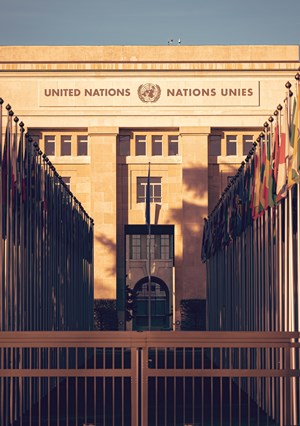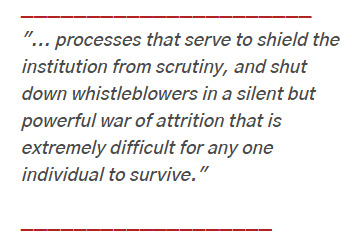27 August 2021
Op-Ed by Anna Myers, Executive Director of WIN
Emma Reilly’s case demonstrates how problematic, if not impossible, it is for UN staff to speak up about potentially serious problems within the system and survive.

We can all agree that inter-governmental organisations are complex. They are established to fulfil important missions that are intended to rise above geopolitical pressures and diplomatic game playing but are, at the same time, incredibly vulnerable to both.
However, let us remember there is simplicity here. The United Nations’ mission is to protect and defend human rights around the world. UN staff, and those working in a myriad of ways with it, are incredibly well-placed to alert the organisation when there is a risk that those rights are being violated. In fact, it is essential that the UN’s own practices are subject to scrutiny from within as well as from outside. The point of protecting staff who speak up when they are concerned about such risks is to prevent harm and stop further damage. Whistleblower protections must be designed to ensure the free flow of information for the exercise of institutional accountability.
None of this is easy but the onus here is on the UN. We are not aware of a single whistleblower at the UN who has survived the internal “justice” system when they have suffered retaliation for speaking up. And when we talk  about “survival” we mean seeking and receiving an appropriate remedy for any damage caused to them, a them, and continuing and prospering in their career. Instead, we have seen the application of bureaucratic and administrative processes that serve to shield the institution from scrutiny, and shut down whistleblowers in a silent but powerful war of attrition that is extremely difficult for any one individual to survive.
about “survival” we mean seeking and receiving an appropriate remedy for any damage caused to them, a them, and continuing and prospering in their career. Instead, we have seen the application of bureaucratic and administrative processes that serve to shield the institution from scrutiny, and shut down whistleblowers in a silent but powerful war of attrition that is extremely difficult for any one individual to survive.
None of the safeguards that are now common place in whistleblowing laws the world over exist at the United Nations. The two we focused on here are a) ensuring an individual can choose between alternative protected and independent channels for reporting wrongdoing, including making a public disclosure and b) applying a reversed burden of proof on the employer in any claim against them to prove that the retaliation complained about is unrelated to the whistleblowing and independently fair on its own merits.
The UN has failed to work with the legal experts that have a wealth of experience in ensuring there is better protection for whistleblowers that would give them a fighting chance to survive. It makes the UN even more vulnerable to the geopolitical pressures and diplomatic game playing that it needs to overcome, at least at this very basic level of protecting its own staff.
Human rights whistleblowers like Emma Reilly, Anders Kompass, Caroline Hunt-Matthes, Miranda Brown and countless others believe in the United Nations and so do we! We want people like them to continue to work for the United Nations – serving the needs of the most vulnerable people and communities of the world. It is time for change.
Read WIN's Open Letter to UN Secretary General: Protect whistleblower Emma Reilly
Anna Myers is the founding Executive Director of WIN. She has worked in the field of whistleblowing for 20 years - advising individual whistleblowers, employers of all sizes and sectors, and national and international policy makers.